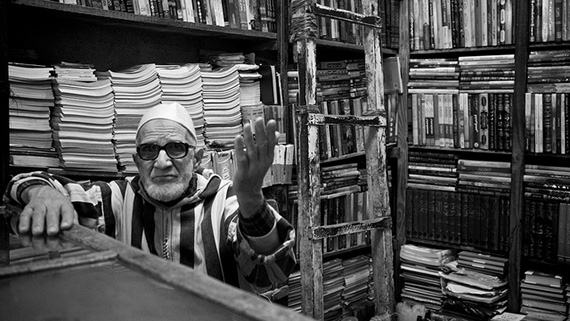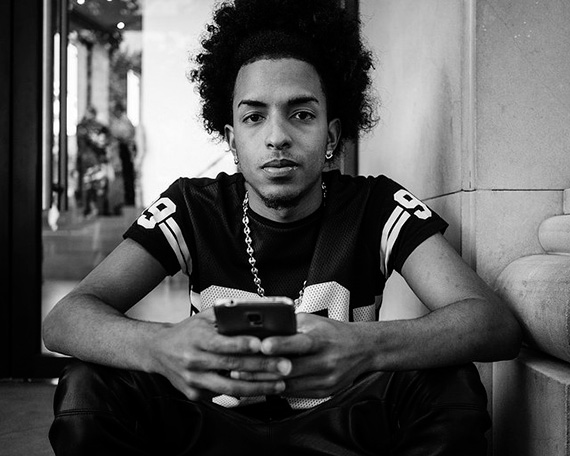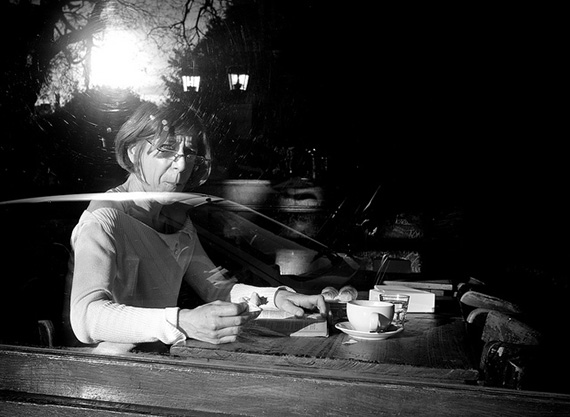Photography sometimes confronts one with an almost Shakespearean dilemma; do I ask to take a picture of someone on the street or simply take the photo and move on? To risk rejection and the petty indignity of small-minded people or opt for the safety and anonymity of “shoot and scoot”?

photo by Thomas Leuthard
Unfortunately there is no one right answer for either street or outdoor photography. As a photographer sometimes you just have to learn to read the situation and use your best judgement.
The good news is there is seldom a moral dilemma involved in taking pictures. There is no expectation of privacy in public spaces outside of areas that modesty would typically dictate there be no surveillance, like bathrooms, public baths, and changing rooms.
What makes this discussion surreal is that the modern world is jammed packed with cameras taking pictures and video of people in public constantly. Walk down any big city street in almost any industrial nation and you’ll turn up on dozens of surveillance cameras; some run by private companies, some run by the state. But those cameras are discreetly hidden from view behind watertight housings, one-way mirrors and dome enclosures. After a while people tend to forget they’re even there.

photo by Raúl González
But they can see a photographer and that big camera and that sometimes triggers an overreaction in some of the world’s self-appointed picky-poo hall monitors and bored security guards. Almost every street photographer has at least one story about about being confronted by angry subjects, security guards, or the police.
Your best defenses are a quick smile, calm demeanor, and solid understanding of your rights. It’s also wise to keep in mind that history is littered with sad stories of people who were dead right. A balance between all those factors will arm you with a good internal guide as to when to stand your ground and when to let it go and walk away.
When it comes to taking pictures of people in public places, sometimes it’s better to just get your pictures and move on. The less time you’re around, the less time for people to get annoyed or suspicious. If you find one subject particularly intriguing, then just walk up ask them if it’s okay to take their picture. You’ll be surprised at how many times people will agree—or agree with some minor condition. If you asked 10 random people on the street, probably 80 percent will not have a problem being photographed and the other 20 percent will have a good reason for not cooperating.

photo by Nicolas Alejandro
Getting turned down is definitely not personal. Some people are in a hurry or were startled by the question. The world is full of scam artists and the predatory and suspicion is unfortunately understandable. Still, despite all that, you’ll be amazed at the people who will say yes.
Don’t be afraid to ask, as it gives you a chance to interact with complete strangers. You’ll make new friends, broaden your social network, and get to know people, even if it’s just briefly, that you might not have met any other way. For many those positive interactions are worth more than the few missed shots from people who said no thanks.
About the Author:
Peter Timko writes on behalf of Proud Photography – which offers online photography courses on a variety of subjects.
Like This Article?
Don't Miss The Next One!
Join over 100,000 photographers of all experience levels who receive our free photography tips and articles to stay current:






“To risk rejection and the petty indignity of small-minded people or opt for the safety and anonymity of “shoot and scoot”?
Geez, people — don’t be so sanctimonious. It is simply the writer’s ploy to draw your attention and get you to read the rest of the article.
“Your right to shoot a photo stops where my face begins so go shoot a street lamp.” Except, that is NOT the law, at least in the US. :)
Petty indignity? How condescending! There is a moral dilemma: taking something that is not yours without any permission. My face is not yours for the taking. My having to leave the house to get groceries does not give you the right to post my photo without my permission. In fact the law protects the privacy of those who choose not to live a public life: a public life being defined as someone who chooses to put themselves in front of the public like a politician or a an actor, unless it is a news story.
Just because some choose to live their lives on FB for all the world to see, does not mean every one does. I have no easily recognizable photos of myself on my website or my FB page or any of my promo materials and only the occasional photo in the paper with regards to my work and it is always with my permission.
While there may be security cameras everywhere that does not mean that we all like having our pictures on the security cameras but the alternative is to never leave the house. And the reasonable expectation is that should a security video be displayed publicly, your face will be blurred out unless you are the one they are looking for; unlike street photography where the expectation is that your image will be posted on the internet for all to see.
There are many people, primarily women, who have left abusive partners going so far as to change their homes and names to protect themselves. A perfect stranger posting a picture that goes viral for whatever reason could reasonably be expected to put someone’s life at risk.
If the person is not easily recognizable, then fine shoot without asking. If you aren’t going to post it on the internet or in a show, no harm done but I would prefer you don’t. But if your intentions are to post then don’t take my picture without my permission – NO EXCEPTIONS! Your right to shoot a photo stops where my face begins so go shoot a street lamp.
I have mixed feelings on this subject. I ask about 20% of the time.
If you ask, its not a candid shot. Street photography is candid shots in public.
This is sooooooo easy…… imagine someone taking a photo of you that everyone though was great, but you though was awful… made you look bad, silly, stupid, etc………. now how do you feel about taking a picture without permission????
IMO, it becomes a street portrait when you ask permission. There’s nothing wrong with street portraits, but it isn’t street photography. Asking permission after you snap the photo is a good approach to street photography if you really want to ask permission.
I’ve never asked permission when snapping photos in public, and I’ve never had a negative altercation outside of someone giving me a look every now and again. I’ve actually had a few instances of people responding positively after they realized that I snapped their picture. An instance that sticks out in my mind is when I snapped one of my better photos of a guy on the train tuning his guitar; he was completely cool with the fact that I snapped his photo and said that he appreciates that sort of art.
I think that my camera is a positive contributor to my good track record- I rarely use my DSLR for street photography, and I instead use my Canon AE-1 (an older 35mm SLR). I think that many people feel that using an older 35mm SLR or raqngefinder with a prime lens is considerably less creepy/intimidating than using a bigger, modern DSLR with a zoom lens (or even a prime lens)- so they are generally more welcoming. There also seems to be a sort of prestige associated with using an older camera that seems to make people mind having their picture taken less.
I don’t think it hurts to be from NY either.
You did little to answer the question you yourself posed in the title. All you did was offer up some vague made-up reasonings behind why people do what they do and you include some made up percentages and numbers.
There’s really only ONE piece good of advice in this blurb: “Don’t be afraid to ask as it gives you a chance to interact with complete strangers. You’ll make new friends, broaden your social network, and get to know people, even if it’s just briefly, that you might not have met any other way.”
You should try to write with the intent on solving the question posed rather than just citing possible excuses and scenarios with fictitious stats.
Wouldn’t asking ruin the mood of a lot of photos? For example, you see couple in a heated discussion. You couldn’t recreate the moment after asking permission to photograph them. I think you get much more natural expressions if they don’t realize they’re being photographed.
“To risk rejection and the petty indignity of small-minded people”…. so anyone who doesn’t want their picture taken, for whatever personal reasons they may have, is petty and small minded?
I think the author is petty and small minded for not being able to respect other peoples feelings, but maybe that’s just me.
Nicely stated Pete! Wish more people saw what you did.
This is been an huge issue for me. Living in San Francisco there are some crazy characters. Some people who’s faces tell an amazing story. I always want that close up portrait but I’m afraid to ask.
I also find it funny that its way easier to approach a beautiful person rather than an old homeless man with tattoo’s all over his face and ask to take their picture. I feel like without a cam it would be the other way around.
Thanks for the article!
I have to agree with Matthew. Your characterization of someone who rejects you as “petty and small minded” speaks volumes to me.
With the profusion of cameras in public – almost anyone who has a cell phone has a camera – the capabilities of photo-editing software, the potential for stalkers, and the fact that once a picture is on the internet it is there forever, I wonder who WOULD want a stranger taking their picture without at least an introduction and explanation.
I always ask permission before taking a street portrait. I offer them my card. I always tell them why I want to take their photo, usually along the lines, “I like to take photos of interesting people and you sure seem interesting.” In the majority of cases the people say yes. I also get their e-mails and send them copies of the photos. If the person says no, I politely thank them for their time and go on my way.
There have been times I’ve taken photos I just couldn’t pass up, I would then approach the person, show them the photo, tell them why I took it, ask if I could keep it and offer to send them a copy. If they say no, I just delete the photo in their presence and go on my way.
I take usually make the photo without permission and in a fashion most people are unaware of. I then approach the subject, show them the photo(s) and offer to delete it if they are uncomfortable with that while also explaining that I am under no obligation to ask their permission. I have only once ever been asked to delete the photo. However, I live and work in Canada where we tend to be less uptight than some of our friends in other countries. I have no fear of physical altercations here and am confident in law enforcement authorities to respond appropriately.
In a foreign country, I might ask permission first because I am not sure of the law or the mind set of the people. However, that takes the spontaneity out of the ‘Street Photography.’
You trip at the very beginning with your comment, ” To risk rejection and the petty indignity of small-minded people or opt for the safety and anonymity of “shoot and scoot”
That you would approach any of your street subjects with the preconceived notion they are “small-minded” speaks of your overall disrespect for your subjects. That kind of attitude is abominable to any real photojournalists.
I was an award-winning photojournalist for many years (so you know where I’m coming from) and now a college photo educator. I instill in my students the importance of respect for your subject; that includes NOT shooting their picture if that is what they wish.
I have long understood the Native American notion of photography stealing a soul. Rather, I like to consider it as sharing and becoming a part of that soul. If they wish you not to do that, simple good manners requires you to walk away – without the shot.
Matt Lit
blog.LITfoto.com
Colorado Mountain College
facebook: Matthew Eric Lit
Hi Peter,
Thanks for your article. If “there is no expectation of privacy in public spaces”, then how come every time you enter a contest they ask you to provide authorization from the people in the photo. I have some great shots of strangers on the street that I was never able not enter in any contest, as I don’t have a written authorization from them. Yet a contest is not considered a “commercial use” of a photograph. It seems street photography has lost all spontaneity…
You may not need permission to take the pic but what about using it without a model release?